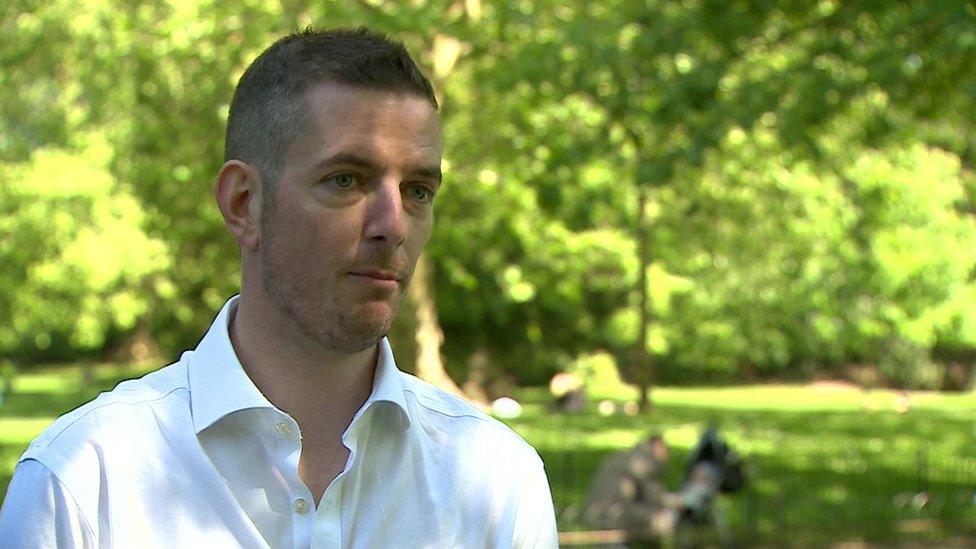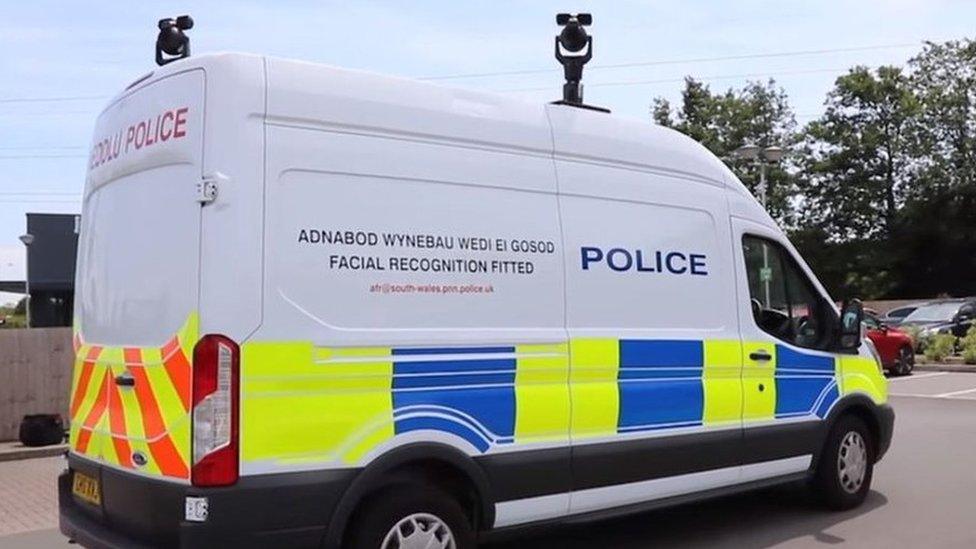South Wales Police in court over facial recognition system
- Published

Ed Bridges and Liberty are bringing the case
Racial and gender biases have not fully been explored in the facial recognition technology used by South Wales Police, the Court of Appeal has been told.
It is the second day of a legal challenge brought by civil rights group Liberty and Ed Bridges, from Cardiff.
"Rigorous safeguards" were needed but these were simply not there, the court heard.
But South Wales Police argues that the codes of practice in place for the technology were sufficient.
Liberty and Mr Bridges claim reasonable steps have not been taken to tell if the technology discriminates and has a bias.
Dan Squires QC said an initial equality impact assessment was done, but it was determined there was no need for a full assessment to be carried out - a breach of the public sector equality duty, he claimed.
The Information Commissioner's Office also argued that there was a lack of a specific legal framework for this "developing technology".
Its barrister Gerry Facenna QC said: "The limits of this technology are virtually unbounded. You have an enormous data set here.
"The dangers inherent in this technology require rigorous safeguards so the public can be content their information won't be used in a way that is not disproportionate when they are going about their ordinary business."
He said those guidelines were not there at present and a national, legal framework was required.

Ed Bridges spotted a police van marked with AFR cameras twice in Cardiff
Mr Bridges brought the challenge after he saw a police van marked with AFR cameras as he took a lunch break in Cardiff city centre and then again at a peaceful protest at an arms fair in the city.
He argued the AFR system analysed his biometric data - digital mapping of a person's facial features - without his knowledge or consent.
By last November, the vans had been deployed on 71 days at 39 events, with 60 people arrested at locations ranging from pop concerts to protests as well as big sporting events.
South Wales Police was the first force in the UK to make an arrest using the real-time technology in 2017, ahead of the Champions League final in Cardiff.
It has argued it has used biometric data analysis "lawfully and proportionately".
'Widespread concern'
Mr Facenna argued that there were currently insufficient rules regarding its use, to protect the public from their biometric data being used unlawfully.
While the system used by South Wales Police immediately deletes images captured of the general public if they do not match those on their "watchlist", Mr Facenna said the force's impact assessment does not acknowledge that AFR still processes people's sensitive data.
"It places too little weight on the interference of their privacy rights and doesn't address the risk of false positives, or intervention by the police," he said.
He said that at every event where AFR had been used, there had been "false positives" - occasions where the technology wrongly identified a member of the public as being on their watchlist, and it resulted in a member of the public being approached by an officer.
Mr Facenna said the gender and racial biases within the algorithms, particularly in today's current climate, need to be grappled with.
"When there is widespread concern of the black community being the target of police power, it is clearly the case any impact assessment needs to grapple with those issues.
"What checks will be taken? Are we satisfied this won't lead to harassment or engagement that's not welcome or necessary?"
But the barrister for South Wales Police argued that there were sufficient codes of practice covering the use of AFR.
Jason Beer QC disputed the comparisons made by Liberty with the taking of DNA or fingerprints, as AFR data is not retained
He said he fundamentally disagreed that it was "a more intrusive measure than the forcible taking of DNA."
He said AFR was closer on the spectrum to the use of CCTV in stadiums.
"CCTV to an extent is a much greater intrusion [than AFR]," he said. "It identifies what a person is wearing, what they are doing. AFR does none of that, it is a pool-narrowing device."
The hearing is due to last three days and is being held via videolink, external.
- Published21 November 2019

- Published23 May 2019
